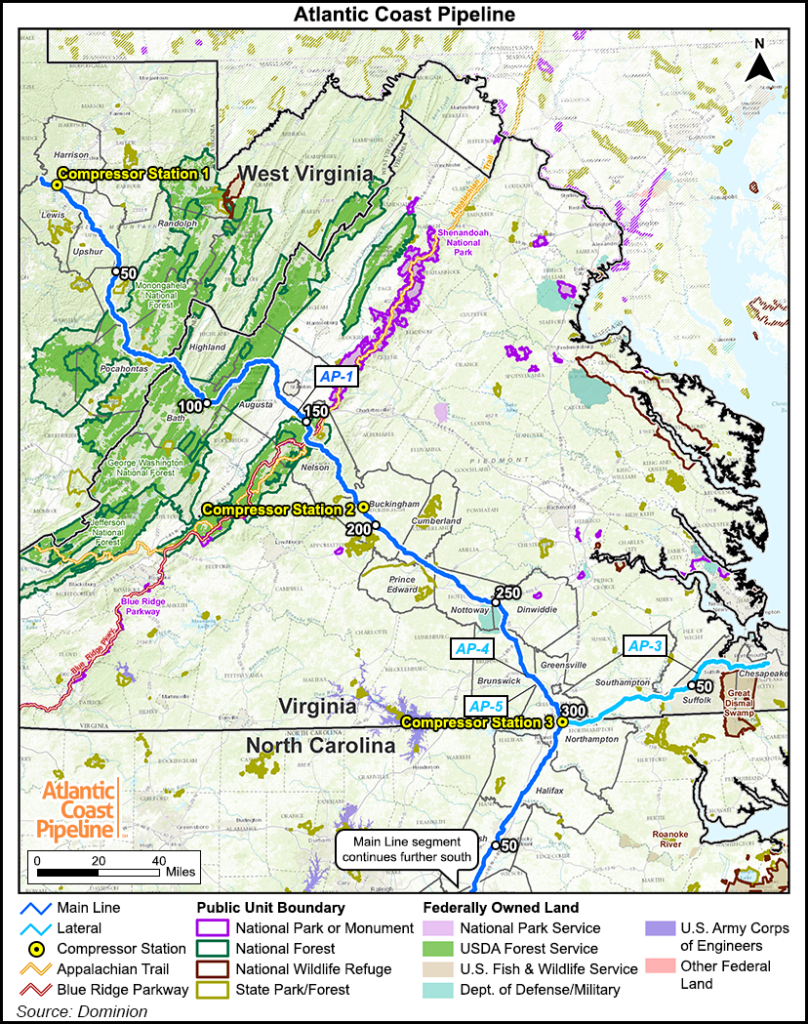Infrastructure | NGI All News Access | NGI The Weekly Gas Market Report | Regulatory
Court Dismisses Enviros Proposed Stay of Atlantic Coast Pipeline
A request filed by a coalition of environmental groups seeking a stay to suspend construction of the Atlantic Coast natural gas pipeline (ACP) has been dismissed by a federal court.

In an order issued Wednesday, the U.S. Court of Appeals for the Fourth Circuit sided with FERC and Atlantic Coast Pipeline LLC, which argued that the court lacked jurisdiction in the case.
The Federal Energy Regulatory Commission issued a certificate authorizing the 600-mile, 1.5 Bcf/d ACP in October, side by side with authorization of the Mountain Valley Pipeline (MVP). Both pipelines are designed to deliver Marcellus and Utica shale gas into Southeast markets. Each greenfield pipeline is to start in West Virginia before crossing into Virginia to interconnect with the Transcontinental Gas Pipe Line (Transco). ACP would also extend south into North Carolina.
A month after FERC authorized ACP and MVP, Appalachian Mountain Advocates, on behalf of a coalition including the Sierra Club, Natural Resources Defense Council and others, filed rehearing requests and hundreds of pages detailing FERC’s alleged failures in certificating the two projects. The issues raised in the rehearing requests generally track closely with those brought up throughout the certification process, with the groups claiming, among other things, that FERC failed to properly assess the market need for the pipes and failed to evaluate alternatives.
In filings with the Fourth Circuit, FERC and ACP argued — successfully, ultimately — that the court did not have jurisdiction because their rehearing application for ACP remains pending before the Commission. Beyond that, they said, Appalachian Mountain Advocates’ arguments against the project were meritless. Courts generally will not entertain appeals to engage in a case until the rehearing process at FERC has been completed.
Some of the same environmental groups that had sought to stall ACP construction had also sought a stay of MVP on similar grounds. That request was denied by the U.S. Court of Appeals for the D.C. Circuit in February.
In December, the West Virginia Department of Environmental Protection (WVDEP) waived the state’s water quality certification (WQC) requirement for ACP, and Virginia conditionally approved a WQC. In January, North Carolina issued ACP a WQC and WVDEP approved the project’s erosion and sediment control permit.
ACP is a joint venture of Dominion Energy Inc., Duke Energy, Piedmont Natural Gas and Southern Company Gas. The project is scheduled to enter service in 2019.
© 2024 Natural Gas Intelligence. All rights reserved.
ISSN © 1532-1231 | ISSN © 2577-9877 | ISSN © 1532-1266 |
